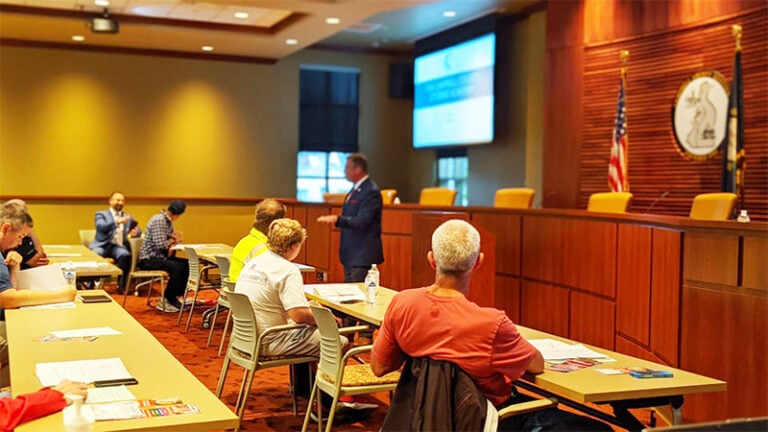Kentucky Attorney General Russell Coleman and members of the state House of Representatives apparently don’t have their hands full addressing the myriad of problems facing the Commonwealth, so now they’re going to help run the state of Texas as well.
Coleman has expressed his support for Texas Gov. Greg Abbott, who is embroiled in a death match with the White House over the millions of folks from Central America knocking on the Lone Star State’s back door. They’re coming in droves and Abbott is developing new ways to close the gates, even though federal law permits many of them to enter the United States to seek asylum.
For one thing, Abbott has arranged razor wire along the Rio Grande in the small city of Eagle Pass to keep the brown folks out despite objections from the White House, which claims, ironically, the obstruction is preventing Border Patrol agents from doing their jobs.
In a 5-4 ruling, the Supreme Court sided with the administration. And Republican hair caught on fire.

“President Biden’s failed open border policy gives drug cartels and criminals a free pass to pour their deadly poison into our country,” Coleman said in a statement. “As a result, Kentucky has become a border state, and our children are at risk. The crisis at the southern border demands a strong response, and I am proud to stand with Governor Abbott in defending the people of Texas.”
Let’s skip the open borders nonsense – there were 3.2 million border actions during the last fiscal year and already 988,819, at last count, this go-round, which hardly indicates border enforcement is off playing pinochle somewhere. And studies have shown, as Coleman surely knows, that most of the illicit drugs hitting the U.S. streets come from ports of entry, not on the backs of asylum seekers.
Coleman is among 26 state attorneys general who have signed a letter to Biden supporting Abbott in his crusade to basically declare that following a U.S. Supreme Court decision is optional, Marbury v. Madison be damned. The AGs declared Texas and, presumably, the other 49 states, “have an independent duty to defend against invasion.”
Now, tens of thousands crossing the Rio Grande seeking asylum is undoubtedly a major problem that needs to be addressed. The United States is a great nation and it would be wonderful if everyone around the world could be an American but that, obviously is an impossibility. The courts have consistently held that the application of immigration laws is the responsibility of the federal government. And characterizing a poor farm worker who trudges an untold distance and swims the river with a wife and kids in tow as an invader is beyond reprehensible.
But they don’t stop there. The attorneys general, including Coleman, further state, “Federal agents are no longer prohibited by a court order from destroying Texas’s wire — but neither has Texas been ordered to stop repairing or replacing the wire. As lawyers yourselves, you must know that reports that Texas is ignoring or ‘defying’ the Supreme Court are wrong, either misunderstanding or deliberately misstating the law.”
Now, let’s see. That declaration is like a judge telling John Dillinger that J. Edgar Hoover can stop him from robbing a bank but then he can just go ahead and rob it again. It’s ridiculous on its face. If the court thought it was okay for members of the Border Patrol to tear down the razor wire so it could carry out its duties on the border, why would anyone assume the state could just go ahead and prohibit them from doing it all over again?
Not to be outdone by Coleman, the Republican-controlled state House, in a 77-17 vote, passed a resolution urging Gov. Andy Beshear, a Democrat, to support Abbott, claiming the Biden administration violated immigration laws, resulting in an ‘’unprecedented influx” of undocumented aliens.
These GOP geniuses rarely indicate what law Biden is violating. They want him to close the border, citing their orange-tinned hero, former President Donald J. Trump, for inspiration, while failing to note that when he tried to close the US southern border to asylum seekers, citing provisions in immigration law, the courts told him to take a hike. Foreign nationals are allowed to seek asylum in the U.S. and they are frequently released into the general public because Congress has failed to fund bedspace where they might be maintained.
Now the House is on the verge of impeaching Homeland Security Secretary Alejandro N. Mayorkas, not for any high crime or misdemeanor but over policy differences. Biden, in fact, is backing bipartisan legislation soon to emerge from the Senate to address many of the ongoing problems. It probably is doomed to failure – the Republican House has prematurely thumbed its nose at any effort hoping to retain immigration as a campaign issue.
Residents of Mexico entered what is now the United States uncontested for centuries, continuing through the 1920s, leading the authors of a report, Migration at the U.S.-Mexico Border for the Migration Policy Institute to declare, “Sustained national attention to immigration across the U.S. southwest border is a relatively recent phenomenon.”
The Immigration Act of 1924, which established limits on the number of immigrants allowed entry into the United States, specifically omitted restrictions on Mexican nationals to placate, as noted in the Oxford Research Encyclopedias, “agricultural, mining, and manufacturing enterprises, which by 1924 had become almost completely dependent on Mexican labor, which they found cheap, tractable, subservient, and willing to endure wretched work conditions without complaint.”
The legislation, also known as the Johnson-Reed Act created the Border Patrol, charged with enforcing immigration laws at the Mexican boundary, by, among other things, establishing inspection stations and waylaying unauthorized individuals. But it was not set up to block the entry of Mexican nationals. Rather, as noted by Oxford, its primary task was to halt the admission of Asians, who were barred entry under the Immigration Act but sought to thwart the ban by entering surreptitiously through Mexico.
“Since 1924, when the U.S. Border Patrol was created mainly to prohibit the unauthorized entry of Chinese immigrants through Mexico — not to stop Mexican laborers — American attempts to regulate entries and exits effectively have been concentrated mainly along the most highly trafficked transportation routes leading north.”
It wasn’t until 1929 that Mexican nationals were required to obtain visas in order to enter U.S. territory, the primary reason being the Wall Street crash and looming Great Depression that ended the need for Mexican labor. As a result, more than 415,000 Mexicans were expelled under the pretext that they lacked proof of legal residency. Untold thousands of other returned south of the border of their own volition. Rep. John Box, D-TX, who served in Congress from 1919 to 1931, who advocated for controlled border crossings, characterized them as “illiterate, unclean peonized masses.”
“In industry and transportation, they displace great numbers of Americans who are left without employment and drift into poverty, even vagrancy, unable to maintain families or to help sustain American communities.”
Issues and legislation aimed at the southern border have ebbed and flowed ever since with variable results. The Bracero Program, which ran from the 1940s until the 1960s, resulted from an agreement between the U.S. and Mexico that allowed a specific number of Mexican temporary workers to enter the U.S. for seasonal jobs, primarily in agriculture.
From the 1980s to about 2014, the influx of unauthorized Mexicans, seeking job opportunities not available in their homeland, proved to be the primary issue. Over that time span, in a bipartisan manner, with sufficient funding and an expanded Border Patrol, the U.S. was able to reduce the number of illicit border crossings to a level considered manageable.
That era ended about 10 years ago. Folks from places like El Salvador and Honduras, exhausted by governmental instability, poverty, street gangs and drug cartels, began arriving at the nation’s doorstep seeking asylum. These aspirants, many of whom travelled thousands of miles with children in tow, have overburdened the system. The numbers of Central Americans arriving at the border began to increase in about 2012. By Summer 2014, this had become a full-blown crisis, dominated by unaccompanied minors.
US immigration courts have witnessed a more than seven-fold increase in asylum cases from fiscal year 2012, when about 100,000 cases were reported. As of December 2022, the number of asylum seekers waiting for asylum hearings in the U.S. reached at least 1,565,966. About half of that total, 787,822, are waiting for immigration court hearings. According to the National Law Review, as of 2022, the backlog in immigration cases has reached 5.2 million cases.
Unlike those who simply tried to sneak across the border, asylum seekers present themselves to border authorities while located in U.S. territory as required by law. As noted by Alan Bersin, Nate Bruggeman, and Ben Rohrbaugh in their report, Migration at the U.S.-Mexico border for Migration Policy Institute:
“Once an asylum claim is made, the claimant is given a ‘credible fear’ test to assess if their claim merits being adjudicated in formal immigration court proceedings. This test has a relatively low threshold, and the vast majority of Central Americans who have arrived since 2014 have met the standard. Claimants who meet this standard are generally released (paroled) into the United States (or in the case of unaccompanied children, eventually placed with a relative or other guardian). While asylum seekers wait for their case to be proceed through the immigration court system, they are allowed to attend school and, in some situations, work after 180 days have passed since filing their asylum application.”
Obviously, both the law enforcement and judicial branches involved in immigration are overburdened. President Biden is seeking funding to increase the number of immigration law judges and Border Patrol agents, who currently number 20,000.
Republicans insist Biden can address the crisis with a stroke of his pen. He can’t. It’s going to require legislation. Yet House Republicans aren’t even considering a potential solution, if only half-baked, germinating in the Senate because Trump, seeking a second four-year term, would rather use immigration as an issue in the fall.
And that’s all you need to know about the current state of the Republican Party.

















